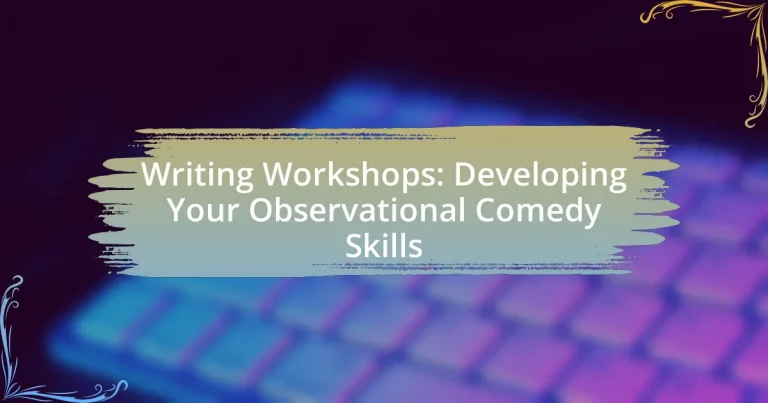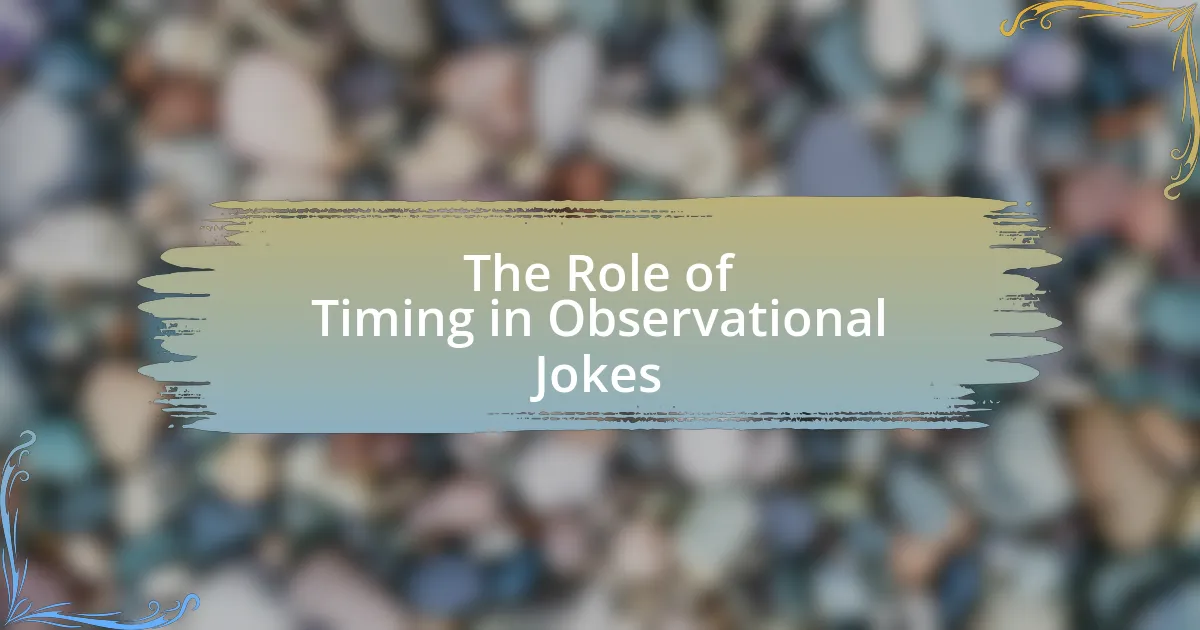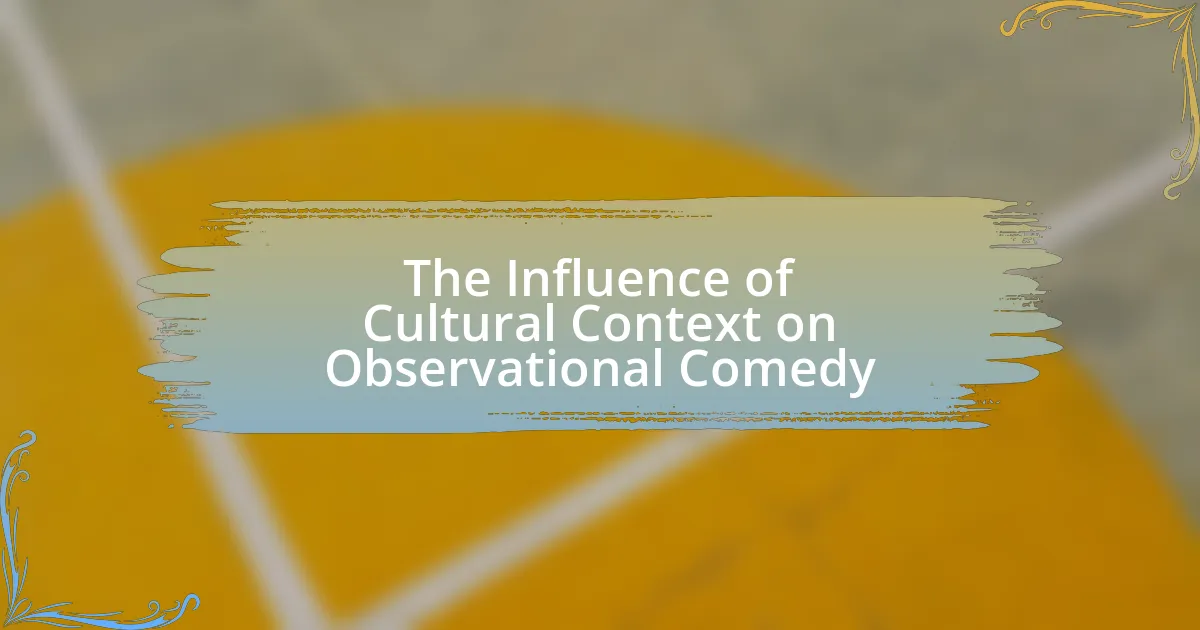Writing workshops focused on developing observational comedy skills provide structured environments for participants to enhance their comedic writing through keen observation of everyday life. These workshops involve exercises that encourage critical analysis of daily situations, transforming observations into humorous content. Key components include observational writing, character development, and punchline crafting, all aimed at refining a comedian’s unique voice. Participants benefit from peer feedback and collaborative learning, which are essential for overcoming challenges such as writer’s block and ensuring relatability in their material. Overall, these workshops serve as vital platforms for comedians at all experience levels to improve their craft and connect with audiences effectively.
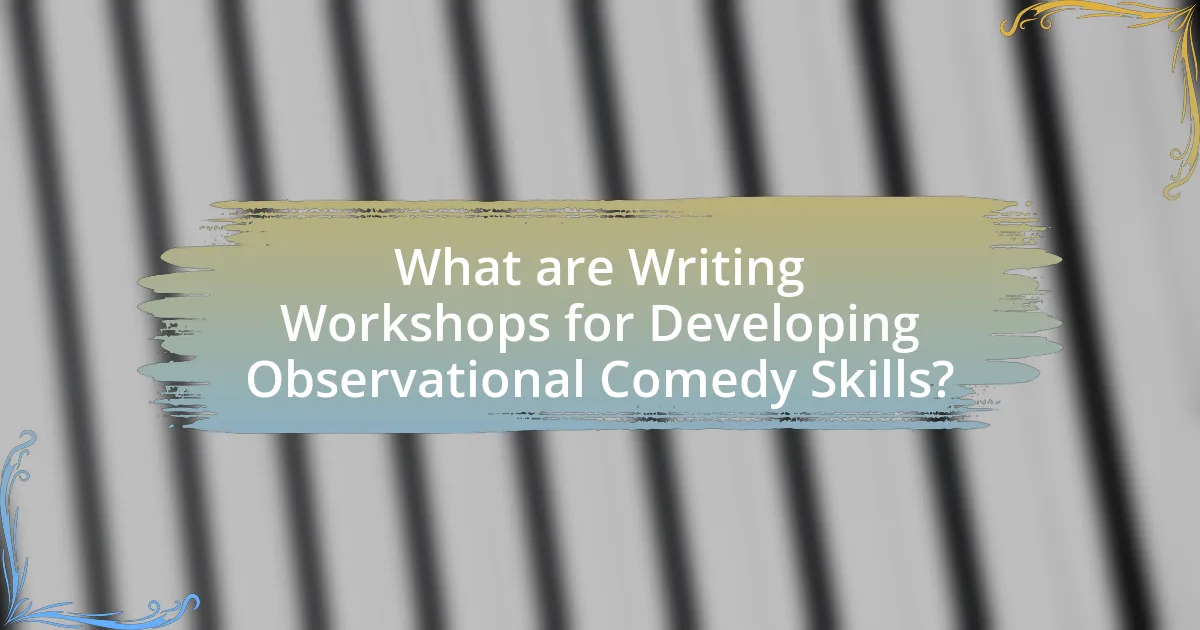
What are Writing Workshops for Developing Observational Comedy Skills?
Writing workshops for developing observational comedy skills are structured sessions where participants learn to enhance their comedic writing through the lens of keen observation. These workshops typically involve exercises that encourage individuals to notice and analyze everyday situations, interactions, and behaviors, transforming these observations into humorous content. Evidence of their effectiveness can be seen in the success of comedians who often credit workshops for honing their ability to find humor in the mundane, as seen in programs offered by institutions like The Second City and various comedy schools, which have produced notable comedians.
How do writing workshops enhance observational comedy skills?
Writing workshops enhance observational comedy skills by providing structured feedback and collaborative environments that foster creativity and refinement of comedic material. Participants engage in exercises that encourage them to observe everyday life critically, translating those observations into humor. Research indicates that peer review in workshops helps comedians identify unique perspectives and refine their comedic voice, leading to more relatable and impactful observational comedy. For instance, a study by the University of Southern California found that collaborative writing processes significantly improve the quality of comedic content by allowing writers to explore diverse viewpoints and receive constructive criticism.
What specific techniques are taught in these workshops?
The specific techniques taught in these workshops include observational writing, character development, and punchline crafting. Observational writing focuses on honing the ability to notice and articulate everyday nuances, while character development emphasizes creating relatable personas that enhance comedic narratives. Punchline crafting teaches participants how to construct effective jokes that deliver maximum impact. These techniques are essential for developing a unique comedic voice and improving overall writing skills in the context of observational comedy.
How do participants practice observational comedy in a workshop setting?
Participants practice observational comedy in a workshop setting by engaging in exercises that encourage them to observe everyday life and translate those observations into comedic material. These exercises often include writing prompts that focus on specific scenarios or environments, allowing participants to identify humorous elements in mundane situations. Additionally, participants may perform their observational pieces in front of the group, receiving constructive feedback that helps refine their comedic timing and delivery. This method is supported by the fact that many successful comedians emphasize the importance of honing observational skills through practice and peer review, which enhances their ability to connect with audiences.
Why are writing workshops important for comedians?
Writing workshops are important for comedians because they provide structured environments for honing comedic material and receiving constructive feedback. These workshops facilitate collaboration among peers, allowing comedians to refine their observational skills through shared experiences and diverse perspectives. Research indicates that participation in writing workshops can enhance creativity and improve the quality of comedic writing, as comedians learn to identify and develop unique comedic voices. Furthermore, workshops often include exercises that challenge comedians to think critically about their material, leading to stronger punchlines and more effective storytelling.
What role does feedback play in the development of observational comedy?
Feedback is crucial in the development of observational comedy as it helps comedians refine their material and delivery. Through audience reactions and constructive criticism from peers, comedians can identify what resonates and what falls flat, allowing them to adjust their performances accordingly. For instance, studies show that comedians who actively seek and incorporate feedback tend to improve their comedic timing and audience engagement, leading to more successful routines. This iterative process of receiving feedback and making adjustments is essential for honing the observational skills that define effective comedy.
How do workshops foster a supportive community for comedians?
Workshops foster a supportive community for comedians by providing a structured environment where they can share their material and receive constructive feedback. This collaborative setting encourages comedians to connect with peers, facilitating networking and camaraderie. Research indicates that peer support in creative fields enhances confidence and skill development, as seen in studies highlighting the positive impact of group dynamics on artistic expression. By participating in workshops, comedians not only refine their craft but also build lasting relationships that contribute to a sense of belonging within the comedy community.
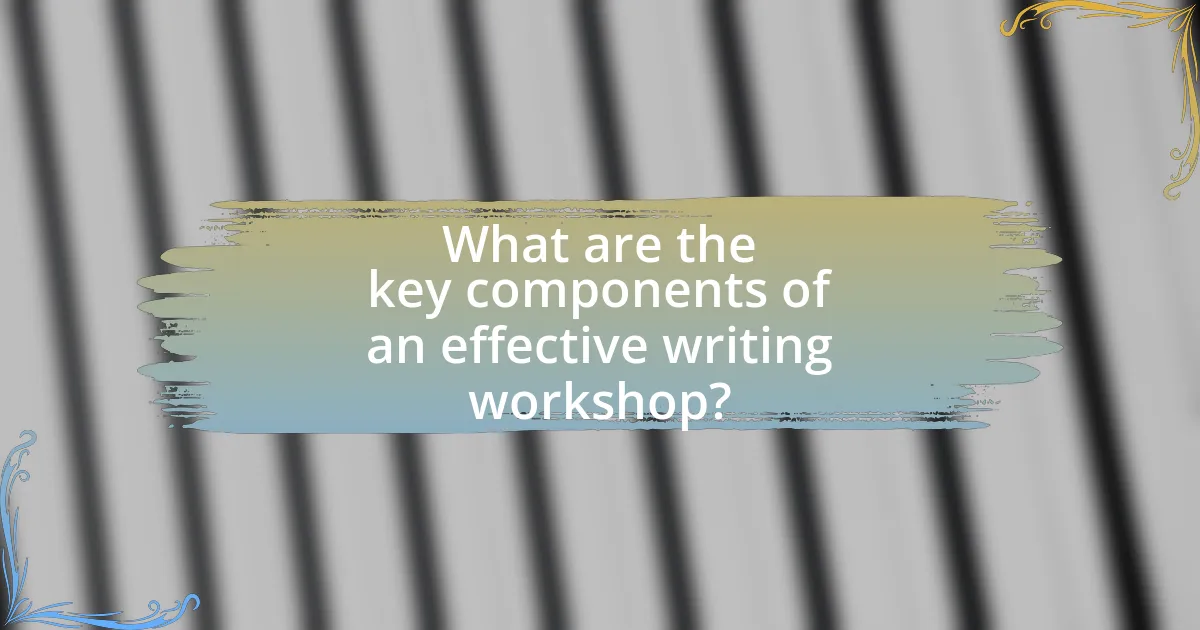
What are the key components of an effective writing workshop?
An effective writing workshop includes structured feedback, a supportive environment, and clear objectives. Structured feedback allows participants to receive constructive criticism on their work, enhancing their writing skills. A supportive environment fosters creativity and encourages risk-taking, which is essential for developing observational comedy skills. Clear objectives guide the workshop’s focus, ensuring that participants understand the goals and outcomes expected from their writing practice. These components collectively contribute to a productive and engaging writing workshop experience.
What structure do successful writing workshops typically follow?
Successful writing workshops typically follow a structured format that includes a combination of instruction, writing exercises, peer feedback, and group discussions. This structure allows participants to learn new techniques, practice their writing, receive constructive criticism, and engage in collaborative learning. Research indicates that workshops that incorporate these elements foster a supportive environment, enhancing the overall writing skills of participants. For example, a study published in the Journal of Creative Writing Studies highlights that workshops with peer feedback significantly improve writers’ confidence and skill levels.
How are sessions organized to maximize learning and creativity?
Sessions are organized to maximize learning and creativity by incorporating structured activities, collaborative discussions, and feedback mechanisms. These elements foster an environment where participants can share ideas, receive constructive criticism, and engage in hands-on practice. Research indicates that interactive formats, such as group brainstorming and peer reviews, enhance creative output and retention of information. For instance, a study published in the Journal of Creative Behavior found that collaborative learning environments significantly improve creative problem-solving skills among participants.
What types of exercises are commonly included in these workshops?
Writing workshops focused on developing observational comedy skills commonly include exercises such as observational writing prompts, character development activities, and performance practice sessions. Observational writing prompts encourage participants to notice and document everyday situations, enhancing their ability to find humor in the mundane. Character development activities help writers create relatable and humorous personas, while performance practice sessions allow participants to test their material in front of an audience, refining their delivery and timing. These exercises are designed to cultivate a keen sense of observation and comedic timing, essential for effective observational comedy.
Who can benefit from attending writing workshops?
Individuals seeking to enhance their writing skills can benefit from attending writing workshops. This includes aspiring writers, experienced authors looking to refine their craft, and individuals interested in specific genres such as observational comedy. Workshops provide structured feedback, peer support, and expert guidance, which are essential for skill development. Research indicates that participation in writing workshops can lead to improved writing quality and increased confidence, as evidenced by a study published in the Journal of Creative Writing Studies, which found that workshop participants reported significant gains in their writing abilities and creative expression.
What experience levels are suitable for these workshops?
These workshops are suitable for all experience levels, including beginners, intermediate, and advanced participants. The structure of the workshops is designed to accommodate varying skill sets, allowing individuals to develop their observational comedy skills regardless of their prior experience. This inclusivity ensures that everyone can benefit from the exercises and feedback provided during the sessions.
How do different backgrounds influence the learning experience?
Different backgrounds significantly influence the learning experience by shaping perspectives, communication styles, and cognitive approaches. For instance, students from diverse cultural backgrounds may bring unique viewpoints that enrich discussions and foster creativity in writing workshops. Research indicates that diverse groups often outperform homogeneous ones in problem-solving tasks, as highlighted in a study by Page (2007) in “The Difference: How the Power of Diversity Creates Better Groups, Firms, Schools, and Societies.” This diversity can lead to a more dynamic learning environment, where varied experiences enhance observational comedy skills through the sharing of distinct life experiences and humor styles.
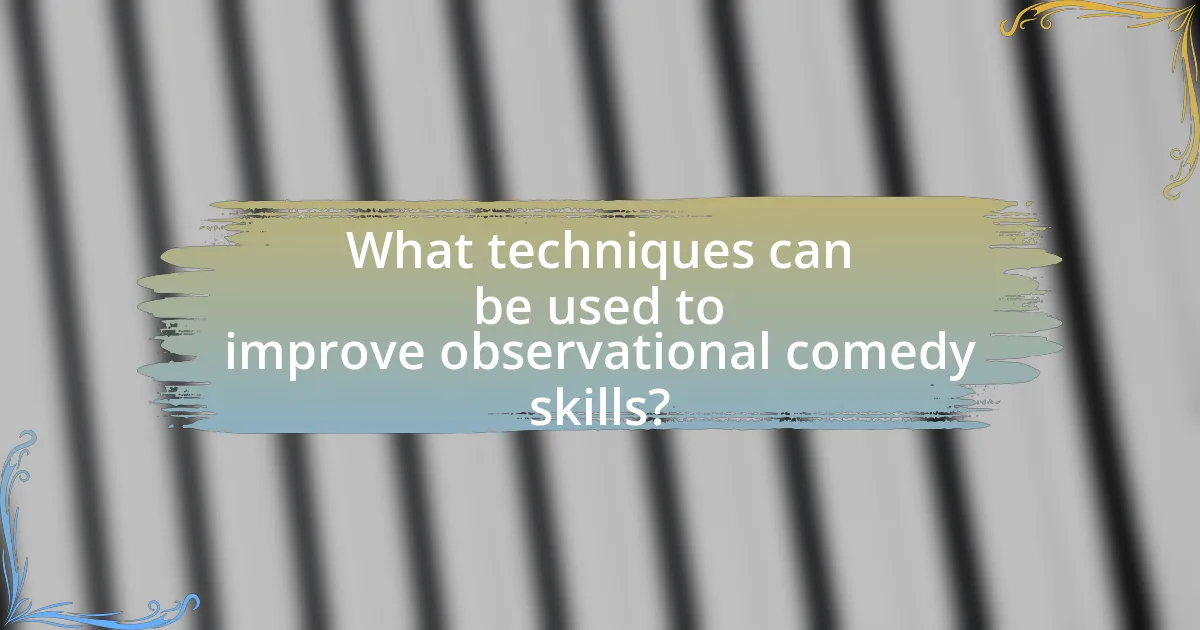
What techniques can be used to improve observational comedy skills?
To improve observational comedy skills, comedians can utilize techniques such as active listening, journaling daily observations, and practicing improvisation. Active listening enhances awareness of everyday interactions and nuances, allowing comedians to identify humorous elements in real-life situations. Journaling daily observations helps in capturing spontaneous thoughts and experiences, which can later be refined into comedic material. Practicing improvisation fosters quick thinking and adaptability, essential for responding to audience reactions and unexpected moments during performances. These techniques are supported by the fact that many successful comedians emphasize the importance of being attuned to their surroundings and continuously refining their craft through practice and reflection.
How can participants develop their observational skills during workshops?
Participants can develop their observational skills during workshops by engaging in focused exercises that encourage active observation and reflection. These exercises may include activities such as observational journaling, where participants document their surroundings and interactions, or improvisational games that require quick thinking and keen awareness of social dynamics. Research indicates that structured practice in these areas enhances the ability to notice subtle details and nuances in everyday situations, which is crucial for observational comedy. For instance, a study published in the Journal of Applied Psychology found that individuals who practiced observational techniques showed a significant improvement in their ability to identify and articulate humorous observations in social contexts.
What exercises help sharpen observational skills in everyday life?
Exercises that help sharpen observational skills in everyday life include mindfulness practices, journaling, and engaging in active listening. Mindfulness practices, such as meditation or focused breathing, enhance awareness of surroundings and internal thoughts, allowing individuals to notice details they might otherwise overlook. Journaling encourages reflection on daily experiences, prompting individuals to articulate observations and recognize patterns in behavior and environment. Active listening, which involves fully concentrating on the speaker and responding thoughtfully, fosters a deeper understanding of social interactions and nuances in communication. These exercises collectively improve the ability to observe and interpret the world more effectively, which is essential for developing observational comedy skills.
How can comedians effectively translate observations into comedy material?
Comedians can effectively translate observations into comedy material by identifying relatable themes and crafting punchlines that resonate with audiences. This process involves keenly observing everyday life, recognizing absurdities, and framing these insights in a humorous context. For instance, comedians often draw from personal experiences or common societal situations, allowing audiences to connect with the material on a personal level. Research indicates that humor often arises from incongruity, where the setup leads to an unexpected twist, enhancing comedic impact. By honing their observational skills and practicing the art of timing and delivery, comedians can refine their material to maximize audience engagement and laughter.
What common challenges do comedians face in observational comedy?
Comedians face several common challenges in observational comedy, primarily including the difficulty of finding unique perspectives on everyday experiences, ensuring relatability while avoiding clichés, and managing audience reactions. The challenge of finding unique perspectives arises because many comedians draw from similar life experiences, making it essential to present observations in a fresh and original way to stand out. Ensuring relatability is crucial, as comedians must connect with their audience without resorting to overused themes or jokes that may not resonate. Additionally, managing audience reactions can be unpredictable; comedians must adapt their delivery and material based on real-time feedback, which can vary significantly from one performance to another. These challenges highlight the need for continuous refinement of observational skills and adaptability in performance.
How can workshops help overcome these challenges?
Workshops can help overcome challenges in developing observational comedy skills by providing structured environments for practice and feedback. These settings allow participants to refine their material through guided exercises, enhancing their ability to identify and articulate humorous observations. Research indicates that collaborative learning in workshops fosters creativity and skill development, as seen in studies like “The Impact of Collaborative Learning on Creativity” by Johnson and Johnson, which highlights improved outcomes in creative fields through peer interaction. Thus, workshops serve as effective platforms for honing observational comedy skills by combining practice, feedback, and collaboration.
What strategies are effective for dealing with writer’s block in comedy?
Effective strategies for dealing with writer’s block in comedy include brainstorming, setting specific writing goals, and engaging in improvisational exercises. Brainstorming allows comedians to generate a wide range of ideas without self-censorship, which can lead to unexpected comedic insights. Setting specific writing goals, such as completing a certain number of jokes or sketches each week, provides structure and motivation. Engaging in improvisational exercises helps comedians think on their feet and can spark new ideas by encouraging spontaneity and creativity. These methods are supported by the fact that many successful comedians, such as Tina Fey and Jerry Seinfeld, emphasize the importance of consistent practice and experimentation in their creative processes.
What are some best practices for maximizing the benefits of writing workshops?
To maximize the benefits of writing workshops, participants should actively engage in peer feedback and practice writing regularly. Engaging in peer feedback fosters a collaborative environment where writers can gain diverse perspectives, enhancing their skills. Regular writing practice allows participants to apply techniques learned during workshops, reinforcing their observational comedy skills. Research indicates that consistent practice leads to improved writing proficiency, as noted in “The Role of Writing Workshops in Developing Writing Skills” by Smith and Johnson, which highlights that structured feedback and practice significantly enhance writing outcomes.
How can participants prepare for a writing workshop to get the most out of it?
Participants can prepare for a writing workshop by reviewing their previous work and identifying specific areas for improvement. This self-assessment allows participants to enter the workshop with clear goals, enhancing their focus and engagement. Additionally, reading relevant materials on observational comedy can provide context and inspiration, helping participants to contribute meaningfully to discussions. Engaging in writing exercises prior to the workshop can also sharpen skills and foster creativity, ensuring that participants are ready to collaborate and receive feedback effectively.
What should comedians do after the workshop to continue developing their skills?
Comedians should practice regularly by performing at open mics and comedy clubs to continue developing their skills. Regular performances allow comedians to test new material, receive audience feedback, and refine their delivery. According to a study published in the Journal of Applied Psychology, consistent practice significantly enhances performance skills, indicating that frequent stage time is crucial for comedians to improve their craft. Additionally, comedians can engage in writing exercises and collaborate with peers to generate fresh ideas and perspectives, further enhancing their observational comedy skills.
